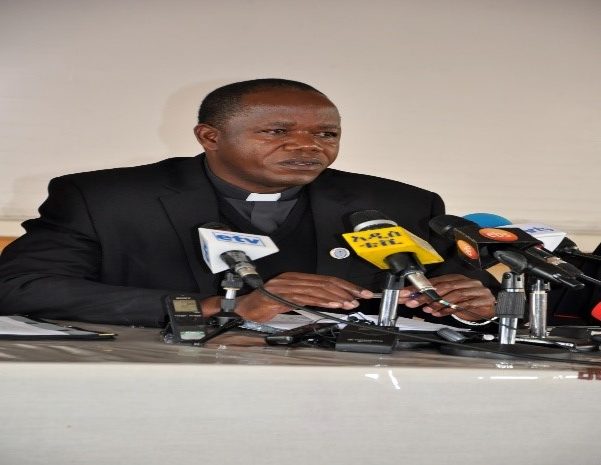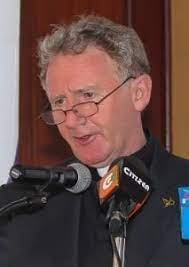(CHALLENGE TO AMECEA TO SUPPORT AFRICA’S GREAT GREEN WALL PROJECT)
By Rev. Fr. Ferdinand Lugonzo, Outgoing Secretary General of AMECEA

“Recently, during the AMECEA 19th Plenary Assembly, at the United Nations conference center in Addis Ababa, Ethiopia, Fr. Patrick Devine Ph.D from the Shalom Center for Conflict resolution and Reconciliation, (SCCRR) gave a substantial input on perspectives regarding Conflict Transformation, Radicalization and Extremism in Eastern Africa. The Assembly brought together over 300 delegates from 12 Countries in Eastern Africa as well as other international experts and practitioners in the fields of integral human development, vibrant diversity, equal dignity, and peaceful unity in God.
Conflict, Radicalization and Terrorism
In his address, he elucidated the negative radicalized transitions on the continuum from a tolerance respecting fundamental differences to the emergence of fundamentalism, onto non-violent extremism, deteriorating further to manifest violent extremism operationalized finally in the intolerance of terroristic acts. Examples of terrorism from a religious ideological extremism perspective focused on attacks in Kenya on Garissa University, Westgate Shopping Mall, and the US Embassy, the attack on the US Embassy in Tanzania, businesses in Uganda, conflict in Somalia, security concerns for Ethiopia, among others. Some key underlying causes of conflict and terrorism in the social, economic, political and cultural religious spheres were specified and responses recommended.
 Violent religious ideological extremism
Violent religious ideological extremism
He said that, “violent religious ideological extremism is concerned with eradicating alternative modes of existence and perception in society through terrorism. This purging of society may be operationalised through non-violent extremism and/or violent terroristic extremism. Ultimately, terrorism is the tool of violent extremism used to purge society of tolerance for other modes of existence in respect to worldviews and faith positions”. The conceptual and real-life jeopardies associated with the politicization of religion and the religionization of politics were accentuated in his presentation. There is value, he said, in reflecting on the idea of an ‘intolerance of intolerance’ within the framework of human rights and integral human development being promulgated, defended, and fulfilled in words and deeds!
Peace and Integral Human Development Studies
During the Assembly he also highlighted the importance of providing appropriate conflict transformation and development studies in third level institutions, but also that some diocesan personnel – religious personnel/laity, especially those impacted by manifest conflict/war, be helped to qualify with a minimum of MA level in these disciplines. He challenged and advocated that Aid Agencies help in this capacity building process, as distinct from just continually dealing with the recurring symptoms of conflict, underdevelopment and poverty. He quoted Jesus from St. Luke’s Gospel, 19;41, when he looked at Jerusalem with sadness, but not without hope, and said “if only today you would know what makes for peace”.
He stressed that ultimately the realization of positive peace is embodied in reconciliation whereby all sides are mutually interested in the security, development and wellbeing of each other. To achieve this there is a need for expertise and long term commitment inserted into conflict environments. Their task should first and foremost be to empower the relevant grass-root communities, through working with their key influential opinion shapers, to be the architects of coexistence and creators of their own peaceful interdependent future of integral human development.
The Environment and Conflict-Peace
He outlined the correlation between the environment and conflict within a demand – supply – equity paradigm. Population growth is causing increasing demand on resources; environmental degradation and climate change are causing a supply catastrophe for human security; cross-cutting this demand-supply scenario are issues of inequity and disparity in the distribution of resources-wealth-institutional support which further escalates issues of structural violence (negative peace) and the potential for humanitarian disasters, manifest violence and terrorism. Some distinguished works addressing the carrying capacity of the environment and security by Paul Gleditsch, (2007, 2015), and Pope Francis’s encyclical ‘Laudato SI’ (2015), among others, were referred to.
‘Environmental Security’, ‘Laudato SI’, and the ‘Great Green Wall’
Fr. Devine chaired/moderated one of the study groups during the Assembly where he initiated a discussion on the Great Green Wall of Trees Project being implemented across the southern perimeter of the Sahara desert. This beautiful life-giving natural wall of nature envisions a 15 kilometer wide wall of trees stretching from Senegal in West Africa to Djibouti in the east. The positive impacts this project will have on issues of human-ecological-cultural survival, climate change, conflict transformation-peace, refugees, migrants, internally displaced peoples, ethnic stability, freedom and global collaboration, among other, were discussed. Overall, this project was considered important for enabling people and nations to meet the requirements of basic human and ontological needs and the actualization of their potential. The substantial links bridging the philosophical underpinnings of ‘environmental security’, ‘Laudato SI’ and the ‘Great Green Wall’ were emphasized. Sr. Eneless Chimbali, SBVM, Secretary General from the Association of Consecrated Women in Eastern and Central Africa, (ACWECA), prepared and presented a precise report on the group deliberations. The proposals emerging from these study groups were reported to the Plenary Assembly for possible action.
The input of Fr. Devine to the Plenary Assembly were very enlightening because they were fact based and helped AMECEA to think of ways through which they could give concrete response to the conflicts experienced in many of the member countries”.
Rev. Fr Ferdinand Lugonzo
‘AFRICA’S GREAT GREEN WALL; AN ORGANISM FOR LIFE AND RECONCILIATION.’ (Fr. Patrick Devine)

